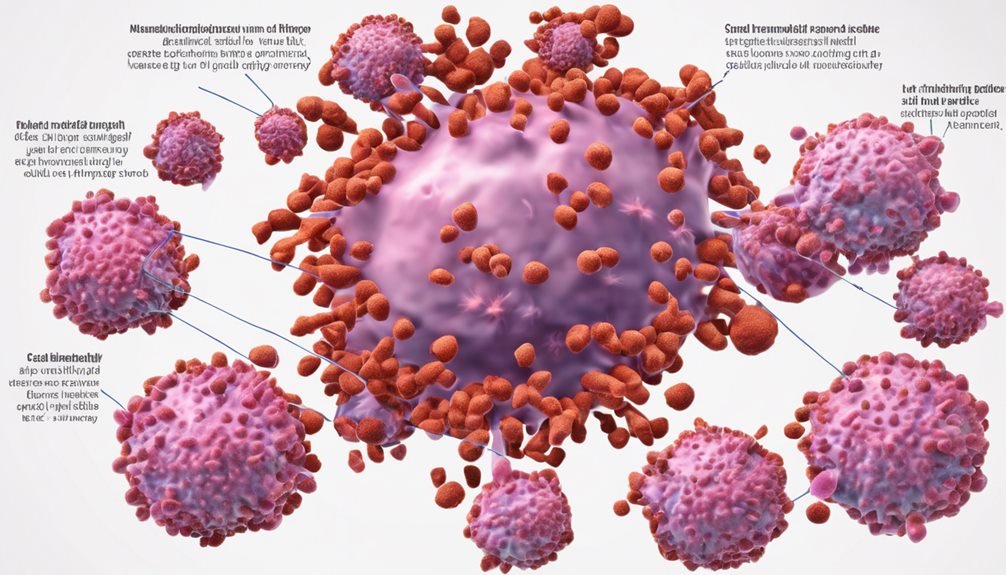Did you know that Mebendazole, a well-known antiparasitic medication, is showing promise in the treatment of various types of cancer? Its potential to target cancer cells through multiple mechanisms has intrigued researchers and clinicians alike. As you explore the intricate ways in which Mebendazole interacts with different cancer types, you may uncover the significant impact it could have on improving cancer treatment outcomes.
Key Takeaways
- Mebendazole inhibits tumor growth in colorectal cancer.
- Mebendazole targets glioblastoma cells to induce cell death.
- Mebendazole demonstrates efficacy against breast cancer cells.
- Mebendazole has shown promise in treating lung cancer.
- Mebendazole exhibits anti-cancer effects in ovarian cancer.
Mebendazole's Anticancer Properties
Mebendazole, a well-known anti-parasitic drug, has garnered significant attention in recent years due to its emerging potential as an anticancer agent. Clinical applications of mebendazole in cancer treatment have shown promise, with research highlighting its therapeutic benefits in various types of cancer. Studies have demonstrated that mebendazole can inhibit cancer cell growth, induce cancer cell death, and prevent metastasis in different cancer models.
One of the therapeutic benefits of mebendazole is its ability to disrupt microtubule function in cancer cells, leading to cell cycle arrest and ultimately cell death. This mechanism of action is crucial in inhibiting tumor growth and progression.
Furthermore, mebendazole has shown synergistic effects when used in combination with other anticancer agents, enhancing its efficacy in combating cancer.
Mechanisms of Action
Understanding the mechanisms of action by which mebendazole exerts its anticancer effects is essential for elucidating its therapeutic potential in cancer treatment. Mebendazole has been shown to target various cellular pathways involved in cancer progression, making it a promising candidate for combating drug-resistant cancers. One of the key mechanisms through which mebendazole exerts its anticancer effects is by disrupting microtubule dynamics, leading to cell cycle arrest and ultimately cell death in cancer cells. Additionally, mebendazole has been found to inhibit angiogenesis, a process crucial for tumor growth and metastasis, further contributing to its anticancer properties.
| Mechanisms of Action | Effects on Cancer Cells |
|---|---|
| Disruption of microtubule dynamics | Induces cell cycle arrest and apoptosis |
| Inhibition of angiogenesis | Suppresses tumor growth and metastasis |
Inhibition of Cancer Cell Growth

By targeting key cellular pathways involved in cancer progression, mebendazole demonstrates potent inhibitory effects on cancer cell growth. The drug exerts its anti-cancer activity by interfering with crucial processes within cancer cells, ultimately leading to the suppression of cell proliferation and survival.
- Cell Cycle: Mebendazole disrupts the normal progression of the cell cycle, causing cancer cells to become arrested at specific checkpoints, hindering their ability to divide and multiply.
- Apoptosis Induction: Mebendazole promotes the activation of apoptosis, or programmed cell death, in cancer cells by upregulating apoptosis markers. This leads to the elimination of abnormal cells.
- Anti-Proliferative Effects: Mebendazole inhibits the rapid proliferation of cancer cells by disrupting their ability to replicate DNA and divide.
- Downregulation of Oncogenic Pathways: The drug interferes with signaling pathways that drive uncontrolled cell growth, contributing to the inhibition of cancer cell growth.
- Induction of Senescence: Mebendazole can induce cellular senescence in cancer cells, halting their ability to proliferate indefinitely.
Induction of Cancer Cell Death
To induce cancer cell death, various mechanisms can be targeted to eliminate malignant cells effectively. One key approach is through the induction of apoptosis, which is programmed cell death. This process plays a crucial role in eliminating damaged or abnormal cells, including cancer cells. Additionally, regulating the cell cycle is essential in controlling cell proliferation and preventing the uncontrolled growth seen in cancer.
| Mechanisms for Cancer Cell Death |
|---|
| 1. Apoptosis induction |
| 2. Cell cycle regulation |
| 3. DNA damage response |
| 4. Inhibition of survival signals |
| 5. Immune system activation |
Apoptosis induction targets the intrinsic pathways within cancer cells, leading to their self-destruction. By manipulating the cell cycle, treatments can halt cancer cells at specific checkpoints, preventing them from dividing and ultimately causing their demise. The combination of these mechanisms provides a comprehensive approach to inducing cancer cell death and inhibiting tumor progression, making them vital strategies in cancer treatment.
Types of Cancer Targeted

In the realm of cancer treatment, Mebendazole has shown promising potential in targeting various types of cancer. This medication belongs to a class of drugs known as anthelmintics, traditionally used to treat parasitic infections. However, recent research has unveiled its efficacy in combating cancer through targeted therapies and novel treatments.
Here are some types of cancer that Mebendazole has been found to target effectively:
- Colorectal cancer
- Glioblastoma (a type of brain cancer)
- Breast cancer
- Lung cancer
- Ovarian cancer
These findings have sparked interest in exploring Mebendazole as a potential therapeutic option across a spectrum of cancers. The ability of Mebendazole to inhibit cancer cell growth and induce cell death in various cancer types highlights its potential as a versatile treatment option. As research in this area continues to evolve, Mebendazole's role in targeted cancer therapy is becoming increasingly significant, offering hope for improved outcomes in cancer treatment.
Clinical Trial Progress
Progress in clinical trials involving Mebendazole as a potential treatment for various types of cancer has shown significant advancements in recent years. New clinical trials continue to explore the efficacy of Mebendazole, focusing on its potential as an anti-cancer agent. Researchers are investigating the impact of different Mebendazole dosages on cancer cells, aiming to determine the most effective treatment regimens.
These new clinical trials are crucial in understanding the full potential of Mebendazole in fighting cancer. By testing various dosages, researchers can gather valuable data on the drug's impact on different types of cancer. This information is vital for optimizing treatment strategies and improving patient outcomes.
As research progresses, the results from these trials will provide valuable insights into the efficacy and safety of Mebendazole as a cancer treatment. The data gathered will help guide future treatment protocols and contribute to the ongoing advancement of cancer therapy. Stay tuned for updates on the evolving landscape of Mebendazole in cancer treatment.
Efficacy in Solid Tumors

Preliminary findings suggest mebendazole exhibits promising efficacy in targeting solid tumors. Mebendazole, an FDA-approved antiparasitic drug, has shown potential in impacting solid tumor growth. Clinical outcomes and tumor response have been the focus of research in this area. Here are some key points to consider:
- Mebendazole has demonstrated anti-cancer properties in various preclinical studies.
- Initial clinical trials have indicated positive tumor response rates in patients with solid tumors.
- The drug's mechanism of action involves disrupting microtubule function in cancer cells.
- Mebendazole's safety profile and low cost make it an attractive option for cancer treatment.
- Ongoing research aims to further explore the potential of mebendazole in treating a wide range of solid tumors.
These insights highlight the growing interest in mebendazole as a potential therapeutic option for solid tumors, emphasizing the need for continued investigation into its clinical efficacy.
Potential for Metastatic Cancer
Recent studies have highlighted the potential of mebendazole in targeting metastatic cancer, showcasing its efficacy in addressing the spread of cancer cells to distant organs. Metastatic potential refers to the ability of cancer cells to migrate from the primary tumor site to other parts of the body, leading to secondary tumors. Mebendazole has shown promise in inhibiting tumor progression by disrupting microtubule function, which is crucial for cell division and migration.
By interfering with these processes, mebendazole can impede the ability of cancer cells to invade surrounding tissues and metastasize to distant sites.
Furthermore, mebendazole has demonstrated anti-angiogenic properties, meaning it can inhibit the formation of new blood vessels that are essential for tumor growth and metastasis. This dual mechanism of action makes mebendazole a potential candidate for combating metastatic cancer by targeting both the cancer cells themselves and the supportive microenvironment that facilitates tumor progression.
As research in this area continues to evolve, mebendazole holds promise in improving outcomes for patients with metastatic cancer.
Combination Therapy Approaches

Combination therapy approaches in cancer treatment involve the use of multiple drugs or treatment modalities to target different aspects of the disease simultaneously. When considering combining Mebendazole with other cancer treatments, it's crucial to be aware of potential drug interactions and adverse reactions that may occur. Here are some key points to keep in mind:
- Drug Interactions: Mebendazole may interact with certain chemotherapy agents, affecting their efficacy or increasing the risk of side effects.
- Adverse Reactions: Combining Mebendazole with other drugs could lead to a higher likelihood of adverse reactions, necessitating close monitoring by healthcare providers.
- Synergistic Effects: Some drug combinations may work synergistically, enhancing the overall anti-cancer effects without significantly increasing adverse reactions.
- Complementary Mechanisms: Different drugs in combination therapy may target cancer cells through complementary mechanisms, improving treatment outcomes.
- Individualized Approach: Tailoring combination therapies to individual patients based on their cancer type and health status is essential to maximize benefits and minimize risks.
Safety and Side Effects
Ensuring the safety and monitoring the potential side effects of Mebendazole in cancer treatment are paramount considerations for healthcare providers and patients alike. Mebendazole has demonstrated a favorable tolerability profile in various studies, with most adverse effects being mild and transient. Common side effects include gastrointestinal symptoms such as nausea, diarrhea, and abdominal pain. It's crucial for healthcare providers to monitor patients for these symptoms and provide appropriate supportive care.
When considering the long-term effects of Mebendazole, current research suggests that it's generally well-tolerated with limited serious adverse events reported. However, more extensive studies are needed to fully understand the potential long-term impacts of Mebendazole treatment on cancer patients. Patients should be informed about the possible side effects of Mebendazole and encouraged to report any unusual symptoms to their healthcare team promptly.
Future Research Directions

Safety and monitoring of side effects are key components in the use of Mebendazole for cancer treatment. As research progresses, future investigations should focus on novel targets and strategies to overcome drug resistance. Here are some potential research directions to enhance the understanding and efficacy of Mebendazole in cancer treatment:
- Identification of Novel Molecular Targets: Explore and identify specific molecular targets within cancer cells that Mebendazole can effectively act upon.
- Combination Therapies: Investigate the potential synergistic effects of combining Mebendazole with other anti-cancer agents to enhance treatment outcomes.
- Drug Resistance Mechanisms: Understand the underlying mechanisms of resistance to Mebendazole and develop strategies to overcome or prevent resistance.
- Optimization of Treatment Regimens: Determine the most effective dosage, administration schedule, and duration of Mebendazole treatment for different types of cancer.
- Clinical Trials: Conduct more clinical trials to evaluate the safety and efficacy of Mebendazole in diverse cancer populations and gather more robust evidence for its use in cancer therapy.
Patient Perspectives and Testimonials
When considering the efficacy and impact of Mebendazole in cancer treatment, patient perspectives and testimonials provide valuable insights into the real-world application of this potential therapy. Patient experiences and treatment outcomes play a crucial role in understanding the benefits of Mebendazole in different types of cancer. Survivor stories can offer hope and inspiration to others undergoing similar treatments. Here are some key points highlighted by patients who have used Mebendazole as part of their cancer treatment:
| Patient Experiences | Treatment Outcomes | Survivor Stories |
|---|---|---|
| Reduced side effects | Tumor shrinkage | Increased quality of life |
| Improved overall well-being | Prolonged survival | Motivation for others |
These testimonials emphasize the positive impact Mebendazole can have on patients, not only in terms of treatment benefits but also in enhancing their quality of life during the cancer journey. Listening to these real-life stories can provide valuable insights for both patients and healthcare providers considering Mebendazole as a potential therapy.
Frequently Asked Questions
Can Mebendazole Be Used in Combination With Traditional Chemotherapy?
Yes, mebendazole can be used in combination with traditional chemotherapy to enhance treatment outcomes through synergy. Combining mebendazole with chemotherapy has shown promise in preclinical studies by increasing the effectiveness of chemotherapy drugs against cancer cells.
This combination therapy approach targets different pathways in cancer cells, potentially leading to improved treatment responses. Further research is needed to determine the optimal dosing and timing for maximizing the benefits of this combined treatment strategy.
Are There Any Dietary Restrictions While Taking Mebendazole?
When taking mebendazole, it's crucial to follow specific nutritional guidance. Some foods can interact with mebendazole, affecting its absorption and effectiveness. To ensure optimal outcomes, avoid consuming grapefruit or grapefruit juice, as it may interfere with the medication.
Additionally, high-fat meals should be avoided as they can impact how your body processes mebendazole. Prioritize a balanced diet while on this medication to support its efficacy in your cancer treatment regimen.
How Does Mebendazole Affect Cancer Cells Specifically?
When examining how mebendazole affects cancer cells, it's crucial to delve into its cellular mechanisms. Mebendazole interferes with microtubule function, inhibiting cell division and inducing apoptosis in cancer cells. Clinical trials have shown promising results, indicating its potential as an anti-cancer agent.
Does Mebendazole Have Any Impact on Cancer Prevention?
Absolutely! Clinical trials have shown that while mebendazole is primarily researched for its potential in treating various cancers, it may also have a role in cancer prevention. However, further studies are needed to confirm its efficacy in this area.
Long term effects of mebendazole in cancer prevention remain a topic of ongoing research. Keep an eye on the latest developments in this exciting field to stay informed about the potential benefits of mebendazole.
Is Mebendazole Effective Against Rare Types of Cancers?
Yes, mebendazole has shown promise in treating rare types of cancers. Clinical trials and case studies indicate its effectiveness in inhibiting tumor growth in various cancer types. While more research is needed to fully understand its mechanisms of action and optimal dosages, initial findings are encouraging. Patients with rare cancers may benefit from exploring the potential of mebendazole as part of their treatment regimen.
Conclusion
In conclusion, Mebendazole's multifaceted approach to inhibiting tumor growth and metastasis shows great promise in the field of cancer treatment. Like a skilled archer aiming for the bullseye, Mebendazole precisely targets cancer cells while disrupting their support system, ultimately leading to improved patient outcomes. With ongoing research and clinical trials, this drug may pave the way for more effective and personalized cancer therapies in the future.






